Revi Schlessinger, co-founder of Kid’s Organic apparel company is not your average entrepreneur mother–she is a mover-shaker woman. Revi’s work has taken her into the world of high tech giants to consumer products to the US government. As a consultant with PricewaterhouseCoopers, Revi helped optimize clients such as IBM, Symantec, Gillette, Mars, Gap, The State of Oregon, and The Disney Company. Now Revi has been a serial entrepreneur on a mission to transform children’s apparel industry.
Her ability to cross-fertilize best practices and her out-of-the box thinking evolved from developing her own startup. Revi has done this by focusing on achievements with quantifiable results, while cultivating a personal drive to make those results happen.
This head on corporate business experience coupled with her husband Nicolay Kreigler, a business consultant in the field of spas, resorts and wellness companies, the two make an interesting compliment to one another. Together they have transformed adversity into a vision, with their adventure and positive footprint spanning the globe.
Five years ago, they sprouted their family in the US, then moved to Bali where they sprouted Kid’s Organic. Now, they are also manufacturing in Africa in partnership with World Wildlife Works leveraging garment manufacturing industry and tourism as alternatives to poaching wildlife.
Amy: Please tell us why you started Kids Organic?
Revi: I was introduced to eco-consciousness and sustainability in 2003 and since then have been aligning my work in business to these values.
In 2008, shortly after my husband and I got pregnant with our first daughter, we had to make a number of rapid dramatic shifts–including leaving our work and Northern California where we had met. Everything we had been doing had to be thrown out the window and we were left with the challenge of how to recreate our careers.
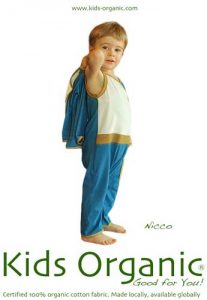 Bringing a holistic approach into our new role as parents, it seemed to make most sense to create work that could be home-based as opposed to going back to the travel-based consulting jobs we had done before. We decided to take our daughter’s first year off so we could fully focus our time on her and figure out what to do next. But life challenges continued, with both of our fathers getting diagnosed with terminal cancers. They passed away within 3 weeks of each other within the first 3 months after our daughter’s birth.
Bringing a holistic approach into our new role as parents, it seemed to make most sense to create work that could be home-based as opposed to going back to the travel-based consulting jobs we had done before. We decided to take our daughter’s first year off so we could fully focus our time on her and figure out what to do next. But life challenges continued, with both of our fathers getting diagnosed with terminal cancers. They passed away within 3 weeks of each other within the first 3 months after our daughter’s birth.
And then Nicolay had a severe illness that grounded us in Los Angeles for 2 months… But eventually we arrived in Bali, Indonesia, for a much-needed 2-month recovery. Our first daughter was 7 1/2 months old and had just started crawling. The Balinese were so lovely with children — this is deeply imbedded in their culture and the Balinese-Hindu religion. In the town of Ubud where we were staying, there was easy access to organic food, a high quality of life, an eco-conscious community, and high speed Internet! So we started to brainstorm and try out businesses that seemed to offer some promise based on the experience we had to offer and the new context we were in and wanted to create.
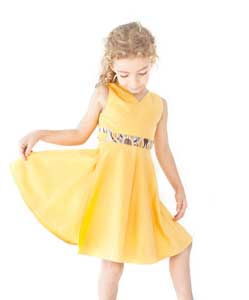 Nicolay, a long time eco-entrepreneur, had always been extremely committed to organics for our daughter. We had dressed her only in organic or well-washed used clothes since she was born. When shopping for her back in the US, I had felt the challenges of finding affordable organic clothes. And as she grew up and we experienced the reality of dressing an infant and active toddler we began to take note of the attributes that we liked most in clothes that aligned with our values as holistic-minded parents. Things like: Easy on and off dressing, minimal over head pieces which we found added an additional level of stress to the process of dressing, comfort and flexibility, gender neutrality, long-wear, and functionality that supported the active exploring phases and transitions from infant to early crawler to walker and then to early running. I had always had an appreciation of fashion as a self-expressive reflection of my personal aesthetic. I had fantasized about being a fashion designer in high school and in my career had worked with the fashion industry as a business strategy and process consultant for some very successful brands.
Nicolay, a long time eco-entrepreneur, had always been extremely committed to organics for our daughter. We had dressed her only in organic or well-washed used clothes since she was born. When shopping for her back in the US, I had felt the challenges of finding affordable organic clothes. And as she grew up and we experienced the reality of dressing an infant and active toddler we began to take note of the attributes that we liked most in clothes that aligned with our values as holistic-minded parents. Things like: Easy on and off dressing, minimal over head pieces which we found added an additional level of stress to the process of dressing, comfort and flexibility, gender neutrality, long-wear, and functionality that supported the active exploring phases and transitions from infant to early crawler to walker and then to early running. I had always had an appreciation of fashion as a self-expressive reflection of my personal aesthetic. I had fantasized about being a fashion designer in high school and in my career had worked with the fashion industry as a business strategy and process consultant for some very successful brands.
So when I heard that there was a natural dyer in Bali that might be able to scale to a commercial level, it seemed logical to explore the opportunity to take organic kids clothes to the next level by launching a brand made solely with organic cotton and chemical free natural dyes.
And so Kids Organic was born…
A: What do you hope to accomplish with your work in children’s apparel?
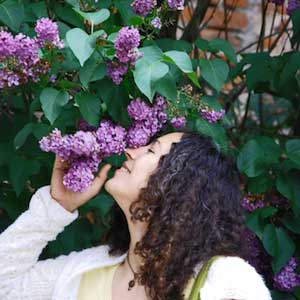 R: Kids Organic seeks to make healthy affordable organic clothing broadly available. We want to fill in the gaps and keep the organic buyer in the market by making sure they can find affordable organic options of the types of clothes they want. We want to take advantage of the tipping point in the price of organic versus conventional cotton and dying and make a compelling enough array of products available such that the non-organic buyer also can’t resist purchasing organic kids clothes.
R: Kids Organic seeks to make healthy affordable organic clothing broadly available. We want to fill in the gaps and keep the organic buyer in the market by making sure they can find affordable organic options of the types of clothes they want. We want to take advantage of the tipping point in the price of organic versus conventional cotton and dying and make a compelling enough array of products available such that the non-organic buyer also can’t resist purchasing organic kids clothes.
By putting competitive organic clothing out in the market we hope to both contribute to, and ride the tide of a shift away from harmful conventional clothing and production practices to healthy sustainable alternatives.
We currently have 3 brands, and each has a unique design sensibility that focuses on the phases where kids at.
Our original brand Kids Organic is based in our original natural dye colors. Design elements are aligned with Attachment Parenting values and the clothes are durable and functional for active babies and toddlers.
YuMiChi our second brand is targeted to kids in the 3 year – 8 year-old phases. The brand is about color, creativity and art, and all the good things we can create with you, me and chi.
Our third brand, Darling Dress, was inspired by a good friend of ours who brought up her challenge of wanting to buy dresses for her granddaughters in organic cotton and not finding anything, anywhere. So Darling Dress in her words are party dresses of the kind “grandma would want to buy.” And of course they should spin and tie and balance the features little girls want for dress up with the simplicity of grandma’s classic tastes.
A: What needs are you trying to address?
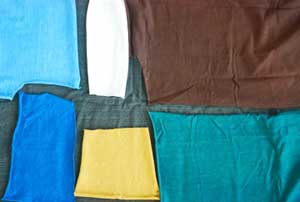 R: When I was in my nesting/pre-mom/shopping-for-the-baby phase, the challenges of buying organic baby clothes were very real.
R: When I was in my nesting/pre-mom/shopping-for-the-baby phase, the challenges of buying organic baby clothes were very real.
Organic clothing was super hard to find; what you did find was limited to a few basic styles, colors and themes; and anything that was even slightly more interesting or fashionable was priced significantly higher then conventional alternatives. It was easy to understand how after baby was born, mom got tired, money became tighter and time became more limited. Most of those early committed organic-buying parents dropped out, gave in and started buying conventional clothing for their growing infants and kids. That’s what happened to most of my ultra-eco-conscious friends who had kids around the same time I did.
Another challenge that plays into this drop out is that there is very little understanding of why organic clothing is so much better for the health of your child and our shared co-existence on this planet.
I can’t help giving a little “save life on the planet” plug. (Revi smiles)
By making a diverse range of organic clothing brands available, we are hoping to enable the organic shopper to stay committed. And, as we become bigger and more successful we hope we can increase the awareness of the benefits of organic apparel. At the same time, we are giving the mom-shopper choices that are practical and fun that they can feel really good about.
A: How do sustainability principles guide your business?
R: As a company, we are committed to only producing products that are in integrity with our values. We have to make a living but we are not willing to compromise on our personal ethics. What we put out in the market has to be something we feel comfortable standing behind and our principles of sustainability, eco-consciousness, social equity and a desire to facilitate a positively driven spiritual evolution guide this.
Each of our brands has a unique design sensibility; addressing specific age categories and the functional and developmental needs of kids in those phases of their self-actualization as contributing human beings on the planet.
Yes – another planet plug. We really are committed to this.
Anyone who has kids has firsthand experience with these little human sponges. What we feed them, how we dress them, what we give them to play with, what we put in and around their bodies has a direct impact on who they become….
We produce only with the healthiest materials available. We currently use only Organic Cotton finished fabric certified according to the Global Organic Textile Standard (aka GOTS). We require and validate 3rd party oversight of every kg or meter of fabric we purchase to confirm that it is made of only certified organic materials, approved low-impact dyes and finishes free of the heavy metals and toxic chemicals commonly used in conventional production. The GOTS standards specify in detail and the certifying agency assures that facility requirements are met, workers are safe and treated fairly, and wastewater is properly managed.
Currently all our garment production is still located in Bali. We continue to work with our original production partner, a small family-run factory located in the family compound where the owners live. Ibu has been cooking and feeding the workers every day for the last 20 or so years. Daily ceremony and ritual bless the facility and workers are highly paid and are supported to balance their work with family life and priorities. We personally oversee all our production facilities to ensure that they are happy healthy places for people to work.
Kids Organic’s first offices were located on the top floor of this factory, right next to the sewers. And both my daughters grew up spending time with me in this family factory environment with waves and smiles as we walked through the facility and took break times together. It’s probably not something many garment companies can say about their factories, but for us this factory and the people who run it and work there are part of our extended family.
We also work with a number of sewing networks that allow parents previously employed in factories or working as independent business owners to work from home and be present with their kids while maintaining a reliable income. This also gives them the flexibility to actively participate in community and ceremonial life, which is a fundamental aspect of Balinese culture.
We take our commitment a step further at every opportunity, scrutinizing every new partner we work with and every material and trim we consider.
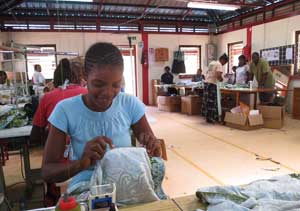 In the long term, I dream of fully integrating my life and my business in a way that supports personal balance, abundance and peace in my life and life on the planet. Separately, we are in a major push to expand our production base with aligned companies both in Bali and outside of Bali. One of the most exciting opportunities that we’ve just started exploring is a strategic collaboration with Wildlife Works that has garment factories in Kenya. By working with these factories we can help employ people on an African wildlife preserve and make a direct contribution to carbon offset and the protection of endangered species. We’re very excited about this relationship as it gives us a new way to take our sustainability commitment to another level.
In the long term, I dream of fully integrating my life and my business in a way that supports personal balance, abundance and peace in my life and life on the planet. Separately, we are in a major push to expand our production base with aligned companies both in Bali and outside of Bali. One of the most exciting opportunities that we’ve just started exploring is a strategic collaboration with Wildlife Works that has garment factories in Kenya. By working with these factories we can help employ people on an African wildlife preserve and make a direct contribution to carbon offset and the protection of endangered species. We’re very excited about this relationship as it gives us a new way to take our sustainability commitment to another level.
A: Tell us about the disruptive aspects of your business that set it apart from others?
R: We have a pretty unusual production process. We keep our production network constantly active, making what is selling within a short timeframe of one to two weeks. So the only inventory we carry is what we have for sale in our Bali factory outlet and a little bit of what we sell on the web. This allows us to minimize waste – we only produce what is actually selling in real time. And this also allows us to be very flexible and responsive to what is happening on the ground in the mom-shopper community. This is considered pretty disruptive for the apparel industry.
We also have an ultra-fast development to market timeframe. Because we’ve been physically located in our production base and have had all of our design resources in house, we can design a garment and sample it within 1-2 weeks and then offer it for sale with our big customer Zulily.
The really cool aspect about working with Zulily is their flash sale model, the real-time sales data they give us access to, and their huge reach allows us to get immediate feedback on how our styles are received in their market place. And because we’ve designed our own company around a complementary a real-time production process, we can produce as much as we need of what’s selling and hold back on producing items that are moving slower during any given time period.
This flash sale model and how we use it as a company probably would be considered pretty disruptive. Whereas flash sales were probably originally intended and probably still are used by most companies as a way to get rid of excess inventory, we actually use them to validate and get immediate feedback from the market about what buyers want.
Lastly and supported by our personal and business objectives of getting affordable organics out there, we offer discount prices from the start of a product’s availability.. We’ve designed our company to do this without compromising our profit margins, by minimizing the risks and carrying costs of excess stock.
A: I’ve also heard about KidZlab. Can you tell me more about it?
R: Yes, we were looking for a Bali production manager and ended up being contacted by a number of individuals interested in moving to Bali for work. One Italian designer/ production manager who has worked for over 10 years managing the design and production processes for a successful Italian brand/retailer contacted us. She was inspired by us and we were inspired by her. So we decided to invite her to develop a brand for us, with the intention of bringing her on for a full time paid position as soon we could afford it. KidZlab is the brand she came up with. It’s playful and fun with a relaxed design sensibility that hints of Rome, which is where the designer is from. The brand is targeted to the 3-9 year old age range. Each style includes functions and features that allow kids to create with their clothes. So the articles of clothing themselves become the kids’ lab 😉 Cool – isn’t it?
Many aspects of our business strategy and our design and production processes are working around this fundamental issue. Our business is not big enough or lush enough yet to be able to survive with the conventional business model of designing what we feel like, producing what we hope we can sell and then discounting or writing off whatever doesn’t. We can’t afford to gamble or take big risks, so we have to get very creative and work strategically.
One of the ways to grow our business that works for us and aligns with our business strategy is to develop or market more brands. This allows us to leverage our strengths in business, design, production management and strategic business management to a broader product base. We can service a portfolio of brands at a rate of growth that is realistic and in a way that is financially viable for us.
A: It sounds like collaboration is a big part of your approach.
R: Yes. Right now its born from necessity but its also inspired by a sustainability framework. A fundamental realization of sustainability is that we are all part of a system. What we do affects everyone around us as well as ourselves.
So as we continued to move our business along in Bali we were exposed to more designers struggling with how to manage their fashion businesses. Our strengths became more apparent and we could see the opportunity of inviting designers and brands to collaborate with us. By collaborating we could together achieve way more then any of us could achieve alone. By collaborating we could support each other to achieve our dreams and for us that dream is to make organic kids clothing widely available.
________________________________________
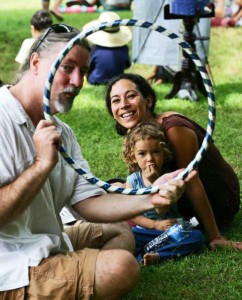 Kids Organic www.Kids-Organic.com also on Facebook as Kids Organic
Kids Organic www.Kids-Organic.com also on Facebook as Kids Organic
Follow us Twitter.com/NobleProfit
Register at Noble Profit to gain valuable insights in related topics.
Noble Profit is brought to you by Creative Entity Org and Creative Entity Productions created by Amy Seidman.

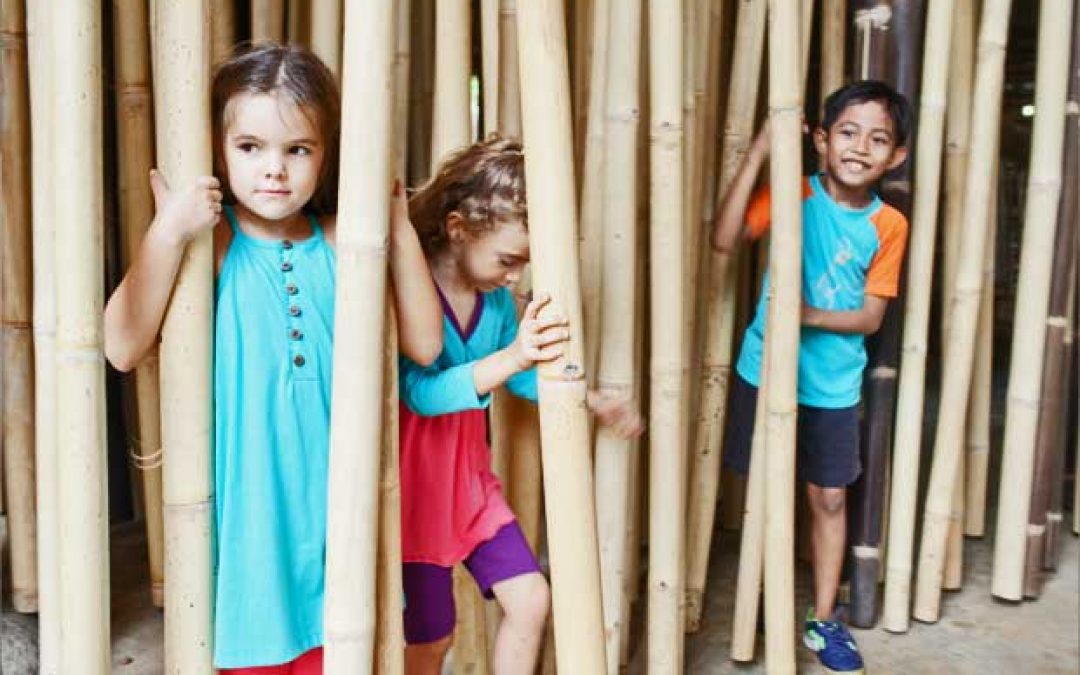
 Noble Profit™ is an authentic source for discovering innovation, trends and investment in clean tech, and sustainable business.
Noble Profit™ is an authentic source for discovering innovation, trends and investment in clean tech, and sustainable business.